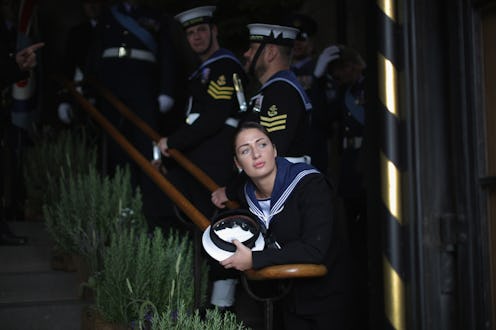News
What The Military's Decision Means To Me
After a year of careful study — because the Department of Defense never does anything quickly — the Pentagon has finally announced that it will be allowing transgender service members to serve openly, joining at least 18 other nations. This is a huge deal for thousands of people who have been living in the closet or in limbo, and I'm incredibly delighted for my trans siblings who are at last able to serve their country while being themselves. But inevitably, the decision is coming with backlash — and not just the anticipated transphobia from people radically opposed to trans military service.
Integrated military service is an incredibly important social frontier. It was important when black men were allowed to serve in mixed units in 1948, when women were allowed to enlist as military nurses in the First World War, when the ban on openly LGBQ military service was formally lifted in 2011, when women were finally allowed to serve in all combat positions in 2015, and it's a big deal in 2016 with this announcement for the trans community. These landmarks don't magically erase discrimination in the military, let alone elsewhere, but they're an important part of the larger social framework. For transphobic bigots, for example, it's unsettling and confrontational to be presented with transgender people who want to serve — who are willing to fight for your right to hate them.
Yet, lots of progressives I saw on my Twitter feed are coming out of the woodwork to condemn the military, arguing that we should be doing more to advance social equality than allowing people to sign up to be killed. Their comments, though, are profoundly disrespectful, ignoring the accomplishments and sacrifices of people who have fought in more ways than one for this moment.
There's definitely a conversation to be had about the social pressures that contribute to the demographic makeup of the military, which is disproportionately occupied by low-income people and people of color, according to a 2008 Syracuse University study. Today, it isn't the children of the wealthy who sign up to serve, and there are reasons for that, and they should be talked about. And we should discuss troubling issues like the fact that the United States allows immigrants to serve while also being unafraid to deport them, as CNN reported earlier this year. These are all things we should be addressing, and yes, there is more that we need to be doing to advance equality.
But at the same time, we should take a step back to acknowledge what allowing transgender people to serve openly means means, because it's huge, and its importance is being erased. Numerous progressives are anti-military, mistaking the military as an entity for the missions it's sent upon. The military doesn't declare war. The military doesn't decide where it goes. The military follows the directives of the commander in chief and Congress. And military service isn't about signing up to kill or be killed.
Members of the military provide foreign aid and serve on peacekeeping missions. Domestically, they respond to national disasters with their equipment and expertise. People with military training go on to become doctors, pilots, legislators, attorneys, and other professionals both in and out of the military. Many past presidents drew upon their military service when making decisions — over half of our presidents have served in the military, according to VA records. My own family served extensively all over the world. My grandfather helped coordinate the Berlin Airlift and my grandmother was a codebreaker. My family and loved ones have died for this country. So don't you dare tell me that military service "isn't important."
Transgender people have fought and died, invisibly, because there was no framework for accepting them. Some have been living with painful dysphoria, terrified to come out and transition. Others have transitioned anyway, defiantly. Some have been discharged because of their gender.
Just last week, a decorated combat veteran and current legislator made headlines for taking her prosthetic legs off so she could sit more comfortably on the floor of the House. Do you want to tell Tammy Duckworth that we have more important things to do than ensuring that people who want to serve in the military and are physically capable of doing so can safely enlist? Because making snide comments about how transgender people in the military do nothing to advance equality is a slap in the face to all service members and veterans, including not just transgender people, but those like Tammy Duckworth.
People join the military for a lot of reasons, and many of them do it because they want to serve their country, and they view the military as one way to do that.
Transgender people in the military joined because they wanted to do something that they felt was important — I would have joined the military, but was unable to do so because of my disabilities. Transgender people have fought and died, invisibly, because there was no framework for accepting them. Some have been living with painful dysphoria, terrified to come out and transition. Others have transitioned anyway, defiantly. Some have been discharged because of their gender.
No matter your stance on military service, I would hope that you can respect people who choose to join the military, and I would hope that you can agree that anyone who wants to join should be able to do so, and should be free to serve in every position. To say otherwise is not only disrespectful, but also discriminatory. It's possible to promote equality for members of the military while also promoting equality on other issues, and I invite you to try it.
